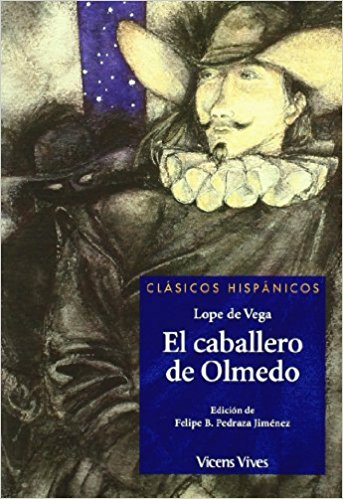

 |

|

The average rating for Caballero de Olmedo based on 2 reviews is 3.5 stars.
Review # 1 was written on 2016-03-25 00:00:00 Jeffrey Dover Jeffrey Dover"Verdad es que se dilata el morir, pues con mirar vuelve a dar vida la ingrata, y así se cansa en matar, pues da vida a cuantos mata; pero muriendo o viviendo, no me pienso arrepentir de estarla amando y sirviendo; que no hay bien como vivir por ella muriendo." |
Review # 2 was written on 2018-03-22 00:00:00 Sandy Page Sandy PageThis is the second work of Lope de Vega that I've read, and it was slightly easier than the first. That is to say that it was extremely difficult for me. Lope de Vega's Spanish is laden with obsolete words and forgotten grammar. What's more, the whole work is in verse, alternating between redondillas, romances, tercetos, and other strophic forms that I do not understand. Added to this is the typically poetic mode of Lope de Vega, with metaphors and allusions crowding every page. I recently saw the work performed at the Teatro de la Comedia, and even Spaniards had some difficulty understanding everything'so imagine my predicament. But the story it not at all complex. A man falls in love with a woman, engages in trickery in order to woe her, and is attacked by a jealous rival. Much of the plot is based on another classic Spanish work, La Celestina: specifically the conceit of having an old spinster act as intermediary between the lovebirds. The characters are traditional archetypes: the wise and wizened matchmaker, the gallant knight, the wiseacre squire, the devious rival, the pure maiden, and the dunderheaded father. This could easily have added up to unadulterated blandness; but Lope de Vega's dramatic instinct and poetic gifts are so surefooted that the play rarely lags or lulls. For its time, El caballero de Olmedo was a genre-bending work: a tragicomedy. Like many of Shakespeare's tragedies, but even more, romantic and comedic elements are interwoven with a fundamentally tragic plot. The most interesting question, for me, is whether Don Alonso, the titular Knight of Olmedo, acted rightly. As the introduction to this edition points out, the idea of "poetic justice" was then, as now, deeply important. Yet Don Alonso, who is valiant and courteous and whose intentions are of only the purest kind, ends up killed. The implication seems to be that he made a mistake. Perhaps his mistake was to hire the go-between Fabia and to carry out his courtship in secrecy, which led to a series of lies. But of course if Don Alonso had done the obvious thing and had simply spoken to his lover's father, there would be no plot and no play. Lope de Vega lacks Shakespeare's talent for creating distinct, changeful, and recognizably human characters. His art lies, rather, in timing, plot, and brilliant imagination. The scene in which Don Alonso gets lost in the forest, hearing voices, echoes, and distant songs, is extremely effective and, on the stage, wonderfully spooky. Another gem from the Phoenix of Wits. |
CAN'T FIND WHAT YOU'RE LOOKING FOR? CLICK HERE!!!